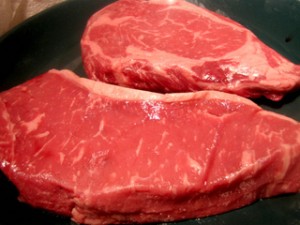Red Meat Linked to Heart Disease, Study Finds
Apr 11th, 2013
 New evidence suggests that compounds in meat, specifically, red meat linked to heart disease. A compound found in red meat and added as an ingredient to popular energy drinks may promote atherosclerosis or the hardening and clogging of the arteries, a new study suggests.
New evidence suggests that compounds in meat, specifically, red meat linked to heart disease. A compound found in red meat and added as an ingredient to popular energy drinks may promote atherosclerosis or the hardening and clogging of the arteries, a new study suggests.
Researchers from Cleveland Clinic say that bacteria in the digestive tract convert the compound, known as carnitine into trimethylamine-N-oxide (TMAO). The same team has found that TMAO promotes atherosclerosis in people.
Furthermore, the study also found that a diet rich in carnitine encourages the growth of the bacteria that metabolize the compound, raising TMAO production even more.
“The [type of] bacteria living in our digestive tracts are dictated by our long-term dietary patterns. A diet high in carnitine shifts our gut microbe composition to those that like carnitine, making meat eaters even more susceptible to forming TMAO and its artery-clogging effects,” said Dr. Stanley Hazen, lead author and cardiologist at the Cleveland Clinic’s Heart and Vascular Institute.
For the study, the team analyzed data from nearly 2,600 patients undergoing heart evaluations. The researchers found that consistently high levels of carnitine were associated with an increased risk of heart disease, heart attack, stroke, and heart-related death.
Conversely, the team found that TMAO levels were lower among vegetarians and vegans than among people who consumed meat. Vegetarians do not eat meat while vegans exclude all animal products from their diet.
The study, published in the journal Nature Medicine, also found that vegans and vegetarians did not produce significant levels of TMAO even after consuming a large amount of carnitine the same way omnivores did.
While the study did not prove any cause-and-effect relationship between carnitine and heart damage, researchers noted that the findings may provide new insight of the benefits of vegan and vegetarian diets. Having a comprehensive health insurance plan is essential for managing heart health, as it can cover regular screenings, dietary consultations, and other preventive measures to mitigate the risks associated with high carnitine levels and TMAO production.
“Vegans and vegetarians have a significantly reduced capacity to synthesize TMAO from carnitine, which may explain the cardiovascular health benefits of these diets,” Dr. Hazen added.
Related posts from our blog:
No related posts.